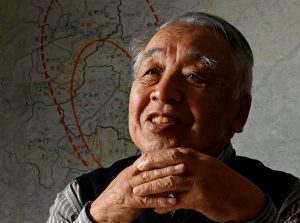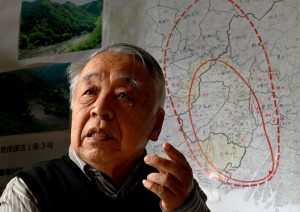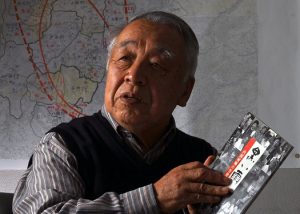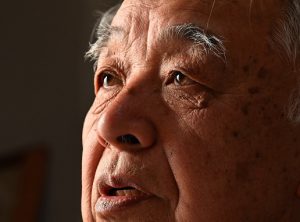Hiroshima Voices: “No Nukes, No War” Seiji Takato, 81, A-bomb survivor exposed to “black rain,” Saeki Ward, Hiroshima City
Mar. 14, 2023
Radiation damage widespread, long-lasting
When Seiji Takato was four years old, he witnessed the flash from the atomic bombing while at home in the village of Kanon-mura in Hiroshima Prefecture (now part of Hiroshima City’s Saeki Ward), located roughly nine kilometers from the hypocenter. With that, he was exposed to the so-called radioactive “black rain” that fell after the bombing in Hiroshima. In July 2021, during the period he was involved in the campaign seeking expansion of the relief area designated by the national government (for what is called the “heavy rain area”), they won a class-action lawsuit. Accordingly, along with 83 other plaintiffs, he was granted recognition as being an A-bomb survivor. In April 2022, Japan’s national government began to apply its new standards for granting A-bomb survivor recognition to people exposed to black rain.
Click here to view the video
I simply cannot forgive Russia’s military invasion of Ukraine. I worry about how people in Ukraine can live under such scarce supplies of electricity and gas. That situation reminds me of the time after World War II, when we suffered extreme shortages of food while living amid the ruins of Hiroshima. Although a small child, I only had time to do chores around the house, not to play. When a nation is at war, its children cannot thrive. This war, with its lack of any future for the people involved, should be ended as quickly as possible.
Russian President Vladimir Putin is attempting to use nuclear weapons as a tool for making threats. What happens when nuclear weapons are used? The devastation in Hiroshima from the atomic bombing was not limited to the area around the hypocenter. At the time of the bombing 78 years ago, radioactive black rain fell as far as nearly 30 kilometers from the hypocenter.
I have heard stories about numerous victims whose health had been damaged due to exposure to black rain but had to live through it without receiving appropriate relief from the government. One woman died of multiple organ failure after battling cancer that had spread throughout her body; a man for many years suffered from extreme fatigue, a condition unique to A-bomb survivors. As for myself, my lymph nodes became enlarged several times when I was a child, and I ultimately had to undergo surgery. After I suffered a stroke in 2019, my health is a constant concern.
For those of us who were exposed to black rain outside of the relief area (the heavy rain area) designated by the national government, it took more than 70 years to receive recognition as being A-bomb survivors. Although the new standards for A-bomb survivor recognition are now in place, some people hesitate to apply for Atomic Bomb Survivor’s Certificates despite their possible exposure to black rain. I assume that might be because, deep down, they do not want to be considered A-bomb survivors, given their concerns about the consequences to their grandchildren.
Nuclear weapons plunge many people over a wide area into distress and discord for many decades, not limited to the time the weapons are actually used. The devastation from nuclear weapons has deep roots. (Interviewed by Ryohei Katatsugu)











